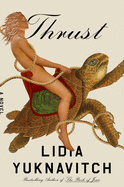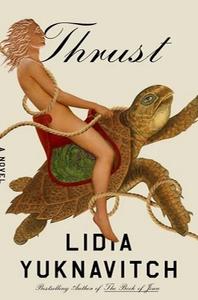
 Lidia Yuknavitch's Thrust is a complex novel of great imagination, outside of time but very much concerned with it. At its center is Laisvė, also known as the Water Girl. In the late 21st century, she and her father hide away from what is left of society in a submerged New York City where only the tip of Lady Liberty's torch is visible at low tide. Laisvė has a fascination with curious objects and an unusual set of skills. "She knew not to be afraid to go to water, because time slips and moves forward and backward, just as objects and stories do." Laisvė is a carrier, who can move not only objects but people, through time as well as space. In Yuknavitch's lovely, weird prose, Laisvė will eventually connect Frédéric, the French sculptor of the Statue of Liberty, and his captivating, beloved cousin Aurora; a violent, abused boy and the social worker--the daughter of a war criminal--who hopes to save him; and a tight-knit crew of three men and one woman who help build the Statue, and who represent "an ocean of laborers."
Lidia Yuknavitch's Thrust is a complex novel of great imagination, outside of time but very much concerned with it. At its center is Laisvė, also known as the Water Girl. In the late 21st century, she and her father hide away from what is left of society in a submerged New York City where only the tip of Lady Liberty's torch is visible at low tide. Laisvė has a fascination with curious objects and an unusual set of skills. "She knew not to be afraid to go to water, because time slips and moves forward and backward, just as objects and stories do." Laisvė is a carrier, who can move not only objects but people, through time as well as space. In Yuknavitch's lovely, weird prose, Laisvė will eventually connect Frédéric, the French sculptor of the Statue of Liberty, and his captivating, beloved cousin Aurora; a violent, abused boy and the social worker--the daughter of a war criminal--who hopes to save him; and a tight-knit crew of three men and one woman who help build the Statue, and who represent "an ocean of laborers."
Yuknavitch (The Misfit's Manifesto; Verge; Dora: A Headcase) moves between worlds as her chapters follow different characters in turn. Some are labeled ethnographies, and form an ode to unrecognized workers, immigrants and misfits. "The story of workers is buried under the weight of every monument to progress or power. Our labor never reaches the height of the sacred. No one ever tells the story of how beautiful we were. How the body of us moved. How we lifted entire epochs." Characters come from all over the world, speak a range of languages and concern themselves variously with history, the arts, social welfare and the body. Their stories are intertwined and connected by Laisvė's travels. Laisvė "wants the words to rearrange, to locate differently, the way language itself could if you loosened it from human hubris and let it flow freely again as a sign system, as the land and water did, as species of plants and animals did, everything in existence suddenly again in flux, everything again possible."
Yuknavitch's writing style is recognizable to readers familiar with her lyricism, coined words, love of the downtrodden, and water as an emphatic theme. Thrust is many things: a speculative history of the United States, a recognition of forgotten classes, a fluid song about the power of love, a celebration of the power of language and storytelling. It is an intricate novel in its interconnections, plotlines twisting away and back together again, but readers' attention will be well rewarded by profound, thought-provoking and deeply beautiful observations about humanity in an ever-changing world. --Julia Kastner, librarian and blogger at pagesofjulia
Shelf Talker: A remarkable girl moves through past and future timelines to connect disparate, marginalized characters in Lidia Yuknavitch's imaginative otherworld.

